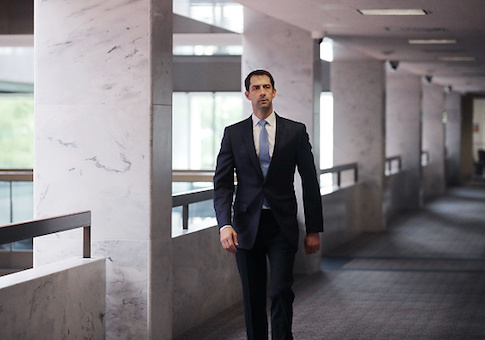Sen. Tom Cotton (R., Ark.) is urging the Trump administration to withdraw from a landmark arms control pact with Russia unless the Kremlin comes back into compliance with the treaty.
Cotton said Monday that President Vladimir Putin has determined he gains more than he loses by violating the commitments mandated under the Intermediate Nuclear Forces Treaty, making it imperative that the United States increase the costs of cheating on the accord.
The United States in February accused Russia of violating the 1987 treaty, which bans the testing, production, and possession of American and Russian land-based intermediate-range missiles, after Moscow deployed a prohibited cruise missile. The Obama administration first accused Russia of violating the treaty in 2014 when it tested the banned missiles, but Cotton said the former president never followed up "in any meaningful way."
The Kremlin has denied any violations.
"For the time being, it's probably best to try to preserve the INF treaty, but only if Russia comes back into compliance promptly and verifiably," Cotton said at an event hosted by the Center for Strategic and International Studies in Washington, D.C. "Should they not do that, then obviously we should not remain in a treaty where we become literally the only country on earth that refrains from building a particular kind of weapons system."
Cotton, a member of the Senate Armed Services Committee, introduced legislation earlier this year that would compel the Trump administration to develop new intermediate missiles within the prohibited range in response to Russia's breaches.
The bill would also allocate $500 million in funding to develop new defense capabilities to counteract any advances made by the Kremlin, facilitate the transfer of intermediate-range missile systems to U.S. allies in Europe, and pull federal funding from two other treaties with Russia that the Kremlin wants to keep in tact.
Cotton said all four provisions were carefully crafted to abide by the treaty's commitments while sending a strong message to Putin that the United States is willing to walk away from the agreement unless Russia comes back into compliance.
The Trump administration is currently assessing whether the United States should remain in the INF as part of a broader review of the nation's nuclear posture. The review, initiated by the Pentagon in April, will be the first such assessment since 2010.
